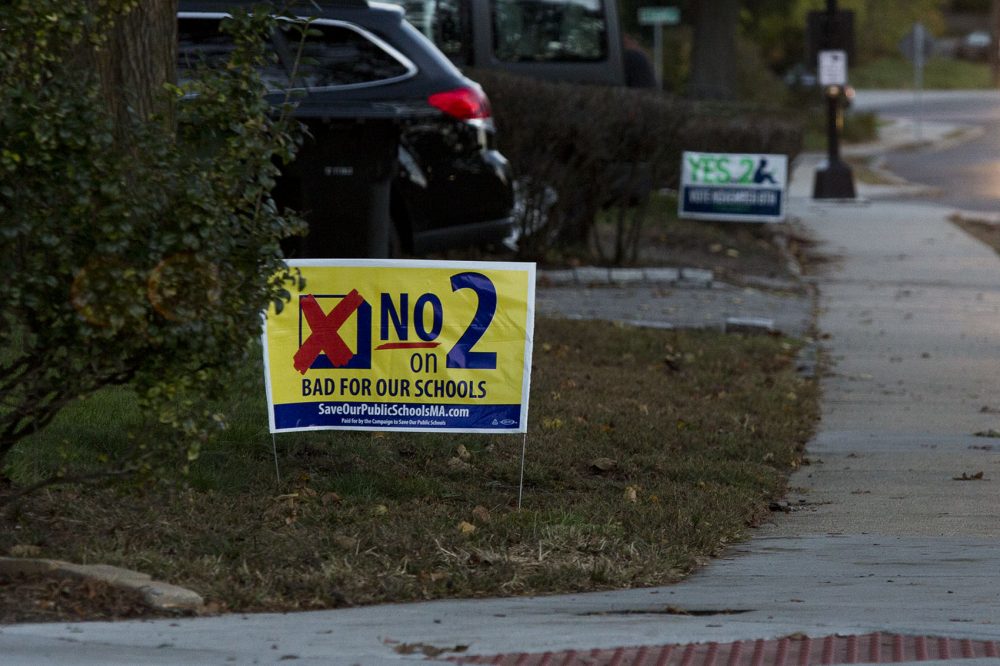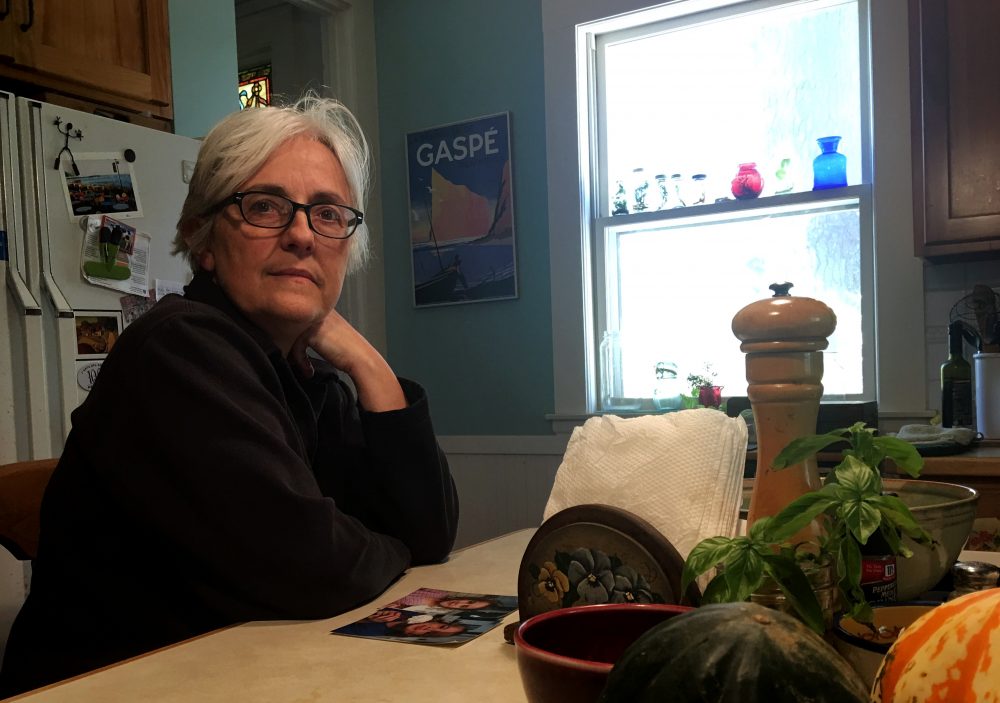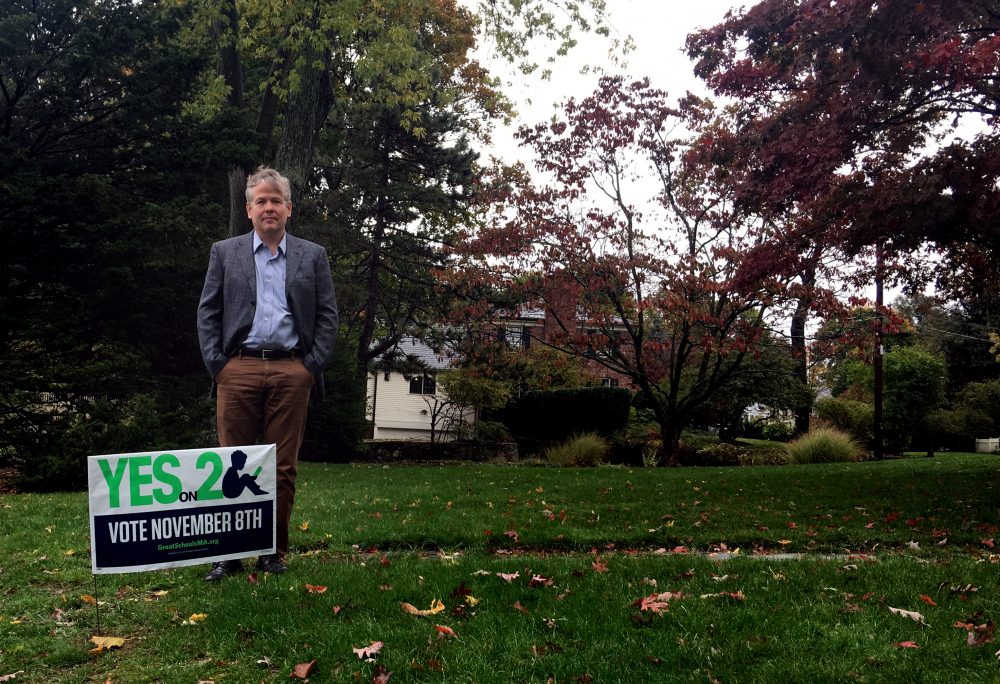Advertisement
Charter Question Splits Suburbs — Even Suburbs With No Charter Schools

Gov. Charlie Baker argues in an ad supporting Question 2, which would allow 12 new charter schools a year, that the change would not affect suburban districts.
Baker’s message directly targets suburban voters:
“If you like your school, Question 2 won’t affect you,” the governor says, “but Question 2 will change the future for thousands of kids who need your help.”
The governor’s argument is based on the fact that most suburban districts have not yet hit their limit on charter seats. Some districts, such as Lexington, Newton, Wellesley and Concord, don’t have any charter schools. Meanwhile, urban districts like Boston, Lowell, Fall River and Everett are at or near capacity. While state figures show there’s room for more than 55,000 new charter seats statewide, most of them aren’t in cities.
Supporters of Question 2 contend that the existing capacity means new charters won’t open in suburban districts, because if there were demand for them, they would already have opened. Opponents, however, express concern that “boutique” charter schools could target suburban parents. More broadly, some suburban voters argue that charter schools take money away from district schools or are opposed to lifting the cap because they object to the privatization of public services.
Conversations with two suburban voters reveal the complexity of their positions. And, no matter how they vote, suburban citizens will have an effect on schools their own children will not attend.
'A Public Responsibility'
Margaret Heitz, 68, has lived in Lexington for 23 years.
She and her husband moved here so that their daughters, who are now adults, could attend the district schools. They chose a home less than a mile away from Lexington High, which is consistently ranked as one of the top 10 high schools in the state.

Heitz is passionate about her family — and about politics. She's one of those diehards you'll often see on street corners, waving around signs for her favorite political candidate.
For this election cycle, she is only holding up signs for one cause: “No on Question 2.”
Heitz says she’s concerned about all the dark money and out-of-state funding in support of lifting the charter school cap.
“This is a public responsibility,” Heitz says, “and I don’t want some hedge fund manager in New York living high off the hog because of some amount of money they’re skimming off my taxes.”
Although Lexington currently has no charter schools, Heitz believes the vague wording of Question 2 could open up the possibility.
'A Way Out'
Eight miles away in West Newton, Tom Kane, 54, lives with his wife and two sons, ages 10 and 16.
Like Heitz, the Kanes were lured by the strong reputation of the schools in their town.
But Tom Kane comes down on the other side of Question 2. He’s voting yes.
“The people who are most affected by this are the most in favor of it,” Kane says. “And the people who are the least affected by it are the people who are most opposed to it, but I think it’s because of a misunderstanding of what the issues are.”

Kane is a professor of education and economics at Harvard University. In 2007, he worked on a study that followed two groups of students in Boston: some who won a lottery to get into a charter school, and others who didn’t. A few years later, the researchers followed up with both sets of children and found that those who attended charter schools scored better on standardized tests.
He believes that if a charter school wanted to open up in Newton or Lexington, it would have happened already because there’s still room for them.
Kane's yes vote, he says, is in support of students who don't have the fortune of going to the schools his sons attend.
“You know, our kids have so many advantages, they would do well even in mediocre schools,” Kane says. “It’s the children and families that are at such disadvantage in so many areas of life that these schools really do potentially represent a way out.”
Focus On Full Funding
Up until a few weeks ago, Heitz says, the stories of "bad public schools" and charter options had been more of an intellectual discussion; her no vote was a matter of principle more than personal experience. Then she met someone who worked in one of those “failing” public schools.
“I met somebody from Fall River who said, ‘You know, the clocks on the walls in our classrooms are broken. They don’t even tell the right time,’” Heitz says. “That points to a real, real problem.”
That encounter actually deepened Heitz's resolve to vote no on Question 2. The focus, she says, should be on improving traditional public schools — not on adding charter seats.
“It’s important for people in the suburbs — some of whom feel sort of a guilt complex, I think,” Heitz says. “They think, ‘Well, we’ve got a great school here in Lexington, but what about those poor kids in Fall River or Lowell or Lawrence or whatever, and they don’t have access to the same money, so if we vote no we are shutting down their opportunity.’ I don’t think that’s the case.”
Advertisement
Both Kane and Heitz agree that legislators should be focused on fully funding traditional public schools. But Kane argues that they've had 50 years to improve schools in urban districts. At this point, he believes, charters provide the best option for kids who are otherwise limited to a failing school.
The latest WBUR poll found that 49 percent of voters in Boston and the inner suburbs said they would vote no on lifting the cap; 44 percent said they are in favor. In the outer suburbs, 54 percent would vote no and 40 percent would vote yes. A Suffolk University/Boston Globe poll shows a tighter margin.
So how is the suburban vote likely to go?
Small Numbers, Big Impact
Cambridge native Lily Geismer wrote about political trends in five Route 128 suburbs: Newton, Lexington, Concord, Lincoln and Brookline. In her book "Don't Blame Us: Suburban Liberals and the Transformation of the Democratic Party," she describes these communities as upper-middle-class areas with a generally liberal stance.
“They're quite liberal on national political issues,” Geismer says. “In the 1960s and ’70s, these are areas that were against the Vietnam War; they were at the forefront of battles over civil rights at the national level.”
But Geismer's research found that these communities tend to be liberal only to a point:
“The closer and closer you get to people’s property values, their tax rights and their children’s education,” Geismer says, “their politics become less progressive.”
While these suburban liberals are a small percentage of the population in Greater Boston, Geismer says, they hold a disproportionate amount of political power because they come out to vote. That's why Gov. Baker has targeted ads speaking directly to them.
We talked with Margaret Heitz after she responded to our callout for experiences with charter and district schools. Subramaniam Vincent, a 2016 John S. Knight Journalism Fellow who tweets @subbuvincent, helped Edify create and manage this project, which we will continue to use to inform our education coverage.
Updated to correct a transcription error in Tom Kane's remark about suburban voters, whom he characterized as "the people least affected" by the proposal to lift the cap. WBUR regrets the error.
This article was originally published on November 03, 2016.
This segment aired on November 3, 2016.
